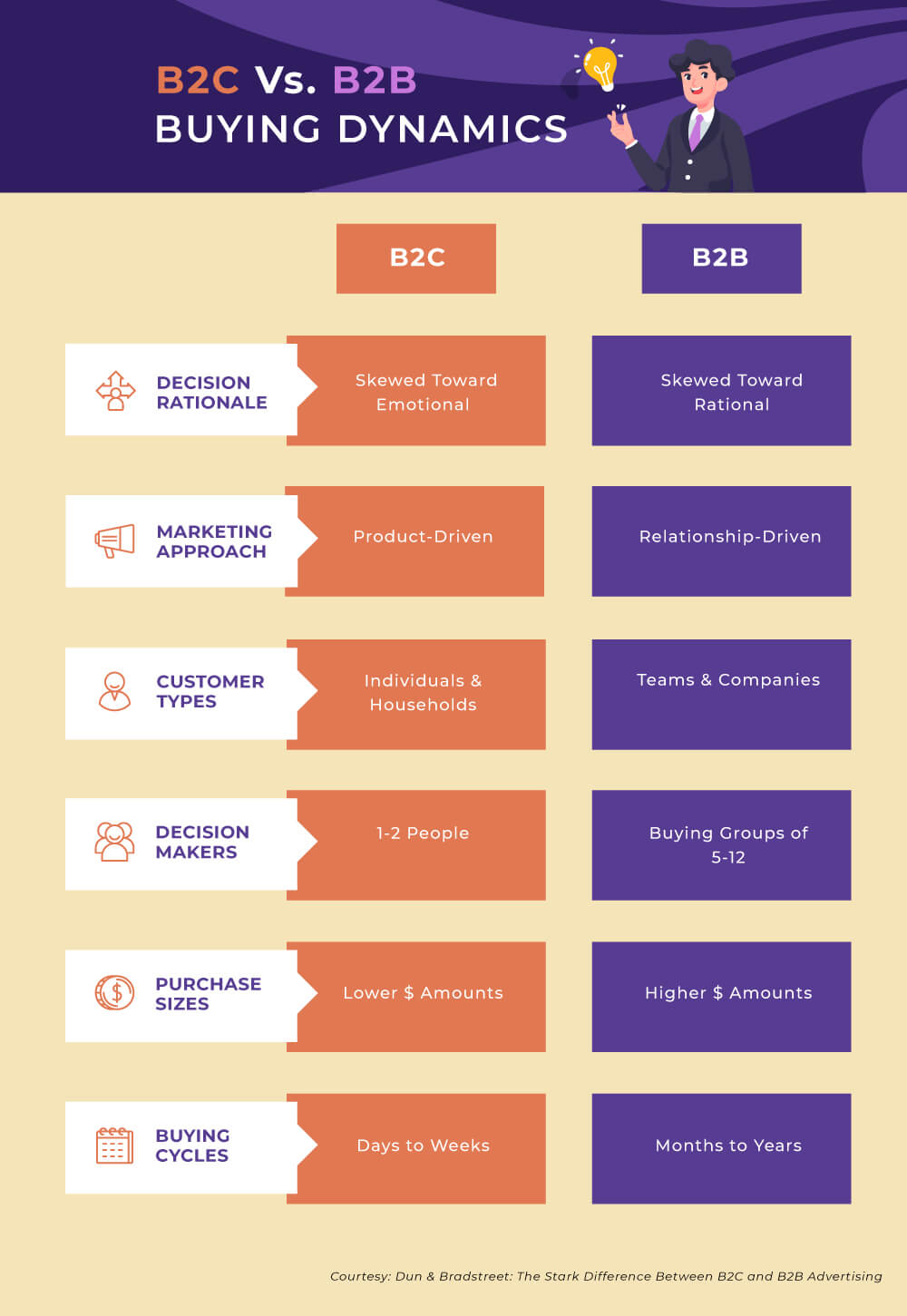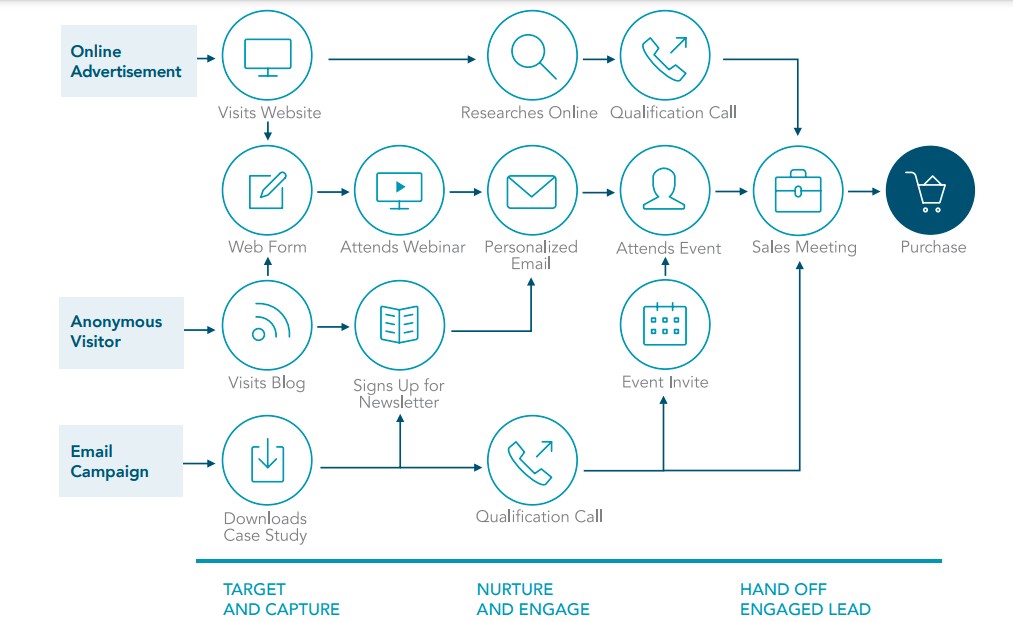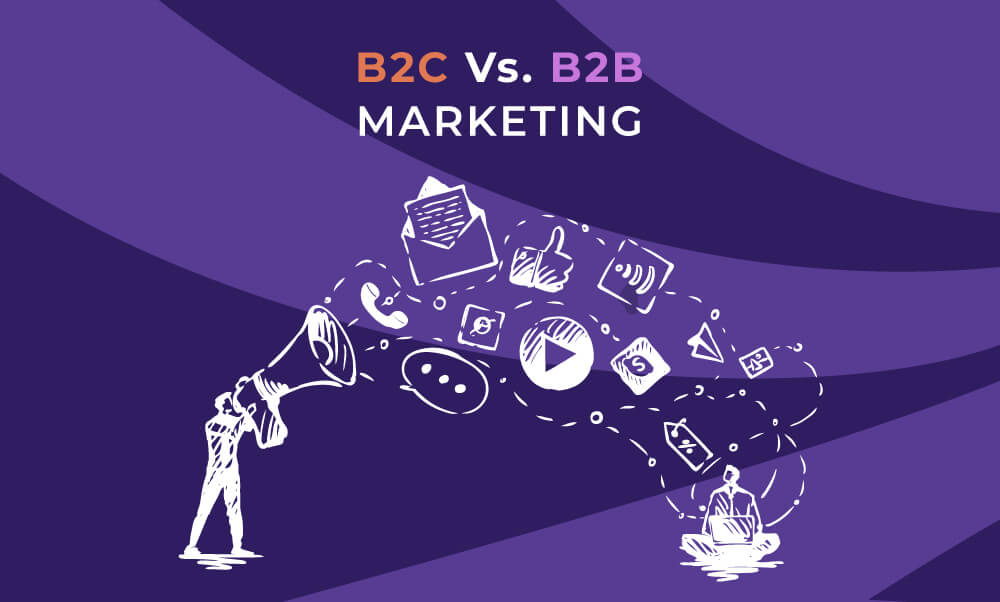B2B marketing is different from B2C marketing in several ways. Of course, there are some similarities between the two strategies. However, a deeper understanding of B2B vs B2C marketing can help you build campaigns that truly resonate with your target audience.
In this article, we will discuss ten key differences between B2B and B2C marketing. But first, let us go through their definitions.
B2B marketing is an acronym for business-to-business marketing. It is the process where one business sells products or services to other businesses. Thus, B2B marketing has to focus on the interests, challenges, and needs of businesses.
B2C marketing is an acronym for business-to-consumer marketing. It is the process where a business is selling products or services to individuals. Thus, B2C marketing has to focus on the interests, challenges, and needs of individuals.

B2B vs. B2C Marketing: 10 Key Differences
B2B and B2C marketing strategies differ mainly in how a business communicates with its audiences. While B2B marketing involves building relationships and proving the ROI of a product or a service, B2C marketing focuses mainly on enjoyable content and quick solutions. The following are the ten key differences when it comes to B2B vs B2C marketing.
1. B2B marketing involves a longer chain of command to deal with
Various department heads, such as accounting and procurement, have to approve B2B purchases. Whereas, in B2C, an individual customer makes their own buying decision. Moreover, B2B customers might escalate the buying decision to someone else before making the purchase. It means that you are not marketing to just one person. You are marketing your products/services to everyone who has a say in the buying decision.
However, in the B2C segment, you only have to market to a single individual.
2. B2B purchase contract might last months or even years
More often than not, B2B purchases are an ongoing relationship. If you do not like the product, you cannot let the product go immediately. It makes B2B buying decisions much more significant.
Moreover, since B2B purchases last longer, you need to keep offering new features. Thus, keeping your customers involved with your product for a long duration.
It may sound more like an after-sales job, but, if you see, marketing has an important role to play here. To engage with B2B customers, marketers need to plan events like webinars, run surveys, promote case studies, write e-books and whitepapers, and produce a lot of content that can help with business strategies.
For instance, the following infographic from Dun & Bradstreet illustrates the complex buying journey of a B2B customer.

On the other hand, B2C purchases may or may not last for months or even days. If customers do not like the product, they can change it immediately with something else. So, marketers play an important role in product positioning, creating brand/product awareness, engaging with prospects through contests, giveaways, and more. Of course, there are exceptions when it comes to products such as cars, homes, and other high-value purchases. But generally speaking, the B2C purchase journey is less complex.
3. B2B buying cycle is much longer than B2C
B2B buying decisions involve accomplishing the long-term goals of the business. Therefore, it requires close attention and more lead nurturing to enhance the user experience. Even the product evaluation process that the customer goes through in B2B is complex.
Whereas, in B2C, the product evaluation process is much simpler and shorter.
Therefore, B2B marketing requires more patience as compared to B2C marketing. Moreover, B2B marketers have to create content that addresses different stages of the buying cycle and gain trust at each step.
[Also read: How to improve B2C sales]
4. Negative reviews give depth and insight into a product to B2B customers
In terms of B2B businesses, buyers make their decision based on two parameters – their requirements and product reviews. As many as 72% of B2B buyers feel that negative reviews give depth and insight into a product. Use this feedback to your advantage and improve your product to meet the market requirements.
B2C marketers are often asked to bury bad reviews on Google. Of course, it is a lot of work. But B2C businesses are hoping to avoid bad reviews altogether. According to G2Crowd, as many as 95% of customers read online reviews before making a purchase and having a negative review can prove costly for B2C businesses. Therefore, always respond to customer reviews. In the instances of negative feedback, offer a replacement or an incentive along with an apology for the inconvenience.
5. Return on investment is more crucial for B2B marketing
B2B customers are concerned with business expertise and efficiency. However, B2C customers seek entertainment and deals.
In other words, financial incentive and logic is something that drives B2B buying decision. As a B2B marketer, you have to focus on the product’s ROI. You will have to think about how the customer will profit from buying the product. It is because the business will only invest if they can make money from your product.
In B2C, ROI may not be the prime concern of buyers. Anything that solves their immediate problem wins the deal.
6. Marketers must understand their target demographic
Usually, B2B businesses have a product catering to a niche market. Thus, it becomes crucial for them to have a better understanding of their target market. On the other hand, B2C businesses cater to a wide range of customers. Of course, they also need to understand the demographic of their customers. But it may not be as detailed as compared to B2B marketing.

7. B2C marketers should not use industry jargons when selling to customers
The use of jargon while communicating with business customers might be acceptable. It is because your target audience is usually familiar with industrial jargon. But it seldom works in the B2C segment.
B2C customers relate to simple things. The simpler the message, the better it is for them. Therefore, B2C marketers must find a way to make their brand relatable to the customer. It means that you must use fewer jargon and buzzwords that may be unknown to your customers. For instance, video-based marketing is becoming popular in the B2C segment, and as many as 83% of the customers prefer the use of informal tone in video content.
8. Emotions drive the buying decisions of B2C customers
B2B customers make a buying decision after thinking about business impact. For instance, they will assess how a product or service can help their brand drive revenue. They will also measure how it generates value or helps achieve long-term and short-term goals.
However, most of the B2C buying decisions are emotion-driven. Friends and families have a significant influence on their buying decisions. Therefore, they think more from their heart than their minds. For instance, while buying a bicycle, the family will have a say in color, brand, model, style, etc.
Therefore, marketers have to find an appropriate approach to selling to B2B vs B2C customers.
9. B2C marketing needs to be attention-grabbing
B2B customers seek knowledge and are ready to spend time to understand a product that can resolve their business challenges.
B2C customers are constantly bombarded with advertisements – whether it is print, digital, or television. So, marketers have only a brief opportunity to draw their attention and stand out from the competition. Also, the attention span of individuals is less. Therefore, B2C marketing needs to be catchy, to the point, and should convey the product benefits easily.
10. B2C customers might not always look for a long-lasting relationship.
Usually, B2B sales involve long-term contracts and have a higher ticket size. Just like the buying decision does not come easy, so is the decision to let go of the product. Therefore, B2B customers are always looking to have a long-lasting relationship with your product.
But that is not always the case with B2C customers. They might not invest in your product as much as you might invest in them.
However, it depends on the types of products. For instance, a B2C customer interested in buying a car would look forward to a lasting relationship with the dealer and insurer. Similarly, in the EdTech sector, the customer tends to be in contact with the institution until the course completion, at least. On the other hand, customers may not care about their relationships with brands that sell FMCG products.
Therefore, as a B2C marketer, you must understand your customer persona and be mindful of that. You will have to determine what kind of content you want to provide them. Moreover, you have to remain content with them just following you on Twitter and not necessarily buying your product.
[Also read: Customer Intelligence – Know Your Customers In & Out]
Final Thoughts
Marketers must understand these key differences when it comes to B2B vs. B2C marketing. It will help you follow a customer-first marketing approach and reach more qualified leads. It will help bring more revenue and profits to your organization.
Marketers must understand these key differences when it comes to B2B vs. B2C marketing. To sum up, when you are marketing to B2B buyers, your strategy should focus on brand values, building long-lasting relationships with customers, and maintaining open communication to understand their business challenges and requirements.
On the other hand, if your target is B2C buyers, you should focus on creating simple, relatable content, use visuals, and be present on trending social platforms.
If you are looking for a marketing automation suite, we have just the right tool for you. Explore LeadSquared marketing automation and CRM combo that can take your marketing campaigns to heights.









